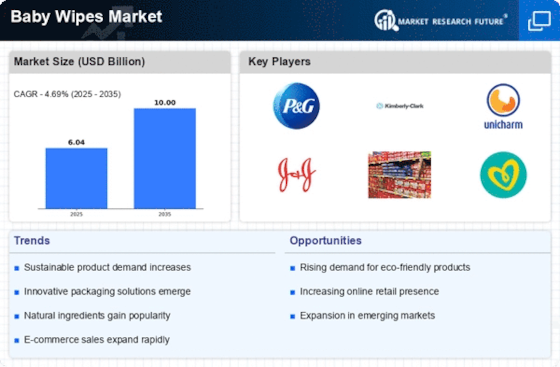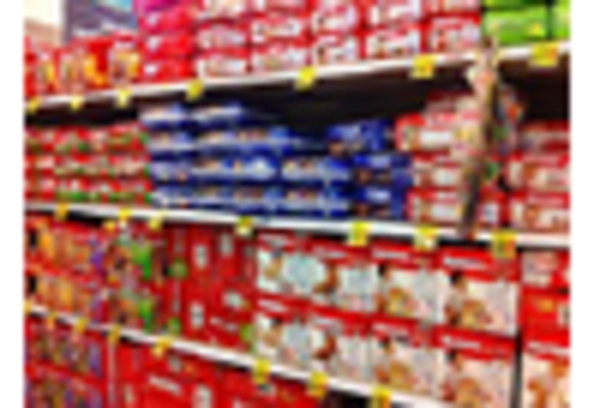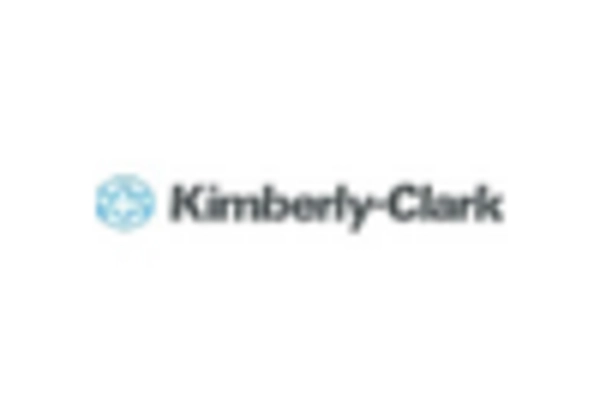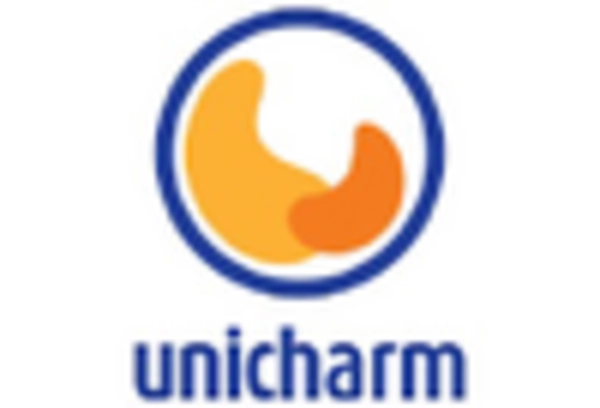Market Share
Introduction: Navigating the Competitive Landscape of the Baby Wipes Market
In the baby wipes market, which is undergoing a transformation, competition is being driven by the rapid spread of technology, the evolution of consumer habits and the stricter regulations. This has led to the entry of new players and new brands. These new players are the traditional manufacturers, new start-ups, and sustainable brands. These new players are reshaping the market by introducing technology-based differentiators that allow them to offer consumers tailored solutions that are more respectful of the environment. Strategically, growth opportunities are emerging, especially in Asia-Pacific and North America, where the focus is on sustainable materials and smart packaging. Understanding these changes in the competitive environment will be of great importance to the strategists and the C-levels of the companies which want to take advantage of the future evolution of the baby wipes market in 2024 and 2025.
Competitive Positioning
Full-Suite Integrators
These vendors offer a comprehensive range of baby wipes products, often integrating various features to meet diverse consumer needs.
| Vendor | Competitive Edge | Solution Focus | Regional Focus |
|---|---|---|---|
| Johnson and Johnson | Strong brand trust and recognition | Baby care products | Global |
| Procter and Gamble | Innovative product formulations | Personal care and hygiene | Global |
| Kimberly Clark | Sustainability-focused products | Hygiene and personal care | Global |
| Huggies | Market leader in baby wipes | Baby hygiene products | North America, Europe |
| Pampers | Innovative and trusted solutions | Diapers and wipes | Global |
Specialized Technology Vendors
These vendors focus on niche markets or specific product innovations within the baby wipes segment.
| Vendor | Competitive Edge | Solution Focus | Regional Focus |
|---|---|---|---|
| Babyganics | Organic and natural ingredients | Eco-friendly baby products | North America |
| Seventh Generation | Commitment to sustainability | Eco-conscious personal care | North America |
| Earth's Best | Organic baby care focus | Natural baby products | North America |
| Nature Babycare | Biodegradable materials | Sustainable baby products | Europe, North America |
Infrastructure & Equipment Providers
These vendors provide essential materials and equipment for the production of baby wipes, focusing on quality and efficiency.
| Vendor | Competitive Edge | Solution Focus | Regional Focus |
|---|---|---|---|
| Unicharm | Advanced manufacturing technology | Hygiene products | Asia, Global |
| Cottonelle | Softness and absorbency | Personal care products | North America |
| NBambo Nature | Eco-friendly and safe materials | Sustainable baby wipes | Europe, North America |
| Chicco | Focus on baby safety and comfort | Baby care products | Europe, Asia |
| Babies R Us | Wide product selection | Baby products retail | North America |
Emerging Players & Regional Champions
- EcoWipes (USA): Specializes in biodegradable and eco-friendly baby wipes, recently partnered with a major retail chain to launch a sustainable product line, challenging established vendors by focusing on environmental sustainability.
- Little Green (UK): Offers organic and hypoallergenic baby wipes, recently secured a contract with a national supermarket chain, positioning itself as a premium alternative to traditional brands.
- Bamboo Baby (Australia): Focuses on bamboo-based wipes that are both soft and sustainable, recently implemented a subscription model that appeals to eco-conscious parents, complementing established brands by offering a unique product.
- Nurture Nature (Canada): Provides plant-based baby wipes with a focus on sensitive skin, recently expanded distribution through online platforms, challenging established vendors by targeting niche markets.
Regional Trends: In 2024, there is a noticeable trend towards organic and eco-friendly baby-wipes, a result of an increased awareness of consumers of the importance of being sustainable. North America and Europe experience a rise in the demand for biodegradable products, while the Asia-Pacific region experiences a rise in the use of e-commerce. Also, a greater specialization is developing, with an emphasis on technology, and on subscription services, in order to improve the convenience of the consumers.
Collaborations & M&A Movements
- Procter & Gamble and Unicharm entered a partnership to co-develop eco-friendly baby wipes, aiming to capture the growing demand for sustainable products in the market.
- Kimberly-Clark acquired the baby wipes division of a regional competitor to strengthen its market share and expand its product offerings in the Asia-Pacific region.
- Huggies and Babyganics collaborated to launch a new line of organic baby wipes, targeting health-conscious consumers and enhancing their competitive positioning in the premium segment.
Competitive Summary Table
| Capability | Leading Players | Remarks |
|---|---|---|
| Sustainability | Pampers, Huggies, Seventh Generation | It is made of a special fabric containing only plant fibers, and is a clear sign of the company's commitment to the environment. The same hypoallergenic material is used in a new line of Huggies wipes. The biodegradable packaging and the production processes used by Seventh Generation are also a clear sign of the company's concern for the environment. |
| Product Innovation | WaterWipes, Babyganics | Water Wipes has the unique composition of 99.9 per cent. water and a drop of fruit extract, and is the purest baby wipe. A range of organic, plant-based wipes for parents who want to use gentle, safe products for their baby. |
| Consumer Engagement | Pampers, Huggies | With its loyalty program, Pampers has successfully engaged consumers, rewarding them for purchases and feedback. Huggies, with its social media, has created a strong sense of community and community among its consumers. |
| Distribution Network | Procter & Gamble, Kimberly-Clark | The products of Procter and Gamble are widely available on the market, in the stores and on the Internet. The distribution of Kimberly-Clark products has been consolidated and facilitated by the establishment of strong alliances with the major retailers. |
| Quality Assurance | Pampers, Huggies | Both Pampers and Huggies put a lot of effort into quality assurance, and in particular Pampers conducts thorough dermatological tests to ensure that the products are suitable for sensitive skin. Huggies has set up a comprehensive quality control system, which includes consumers' feedback on the diapers, so that the diapers can be improved continuously. |
Conclusion: Navigating the Baby Wipes Market Landscape
The competition in the Baby Wipes Market is becoming increasingly fragmented, with established and new players vying for market share by offering differentiated strategies. The region's trend is the growing preference for eco-friendly and sustainable products, which has prompted vendors to come up with new offerings. The traditional baby wipes manufacturers are relying on their reputation to establish a strong foothold in the market and are also deploying automation and artificial intelligence solutions to improve their operational efficiency and customer engagement. While the new entrants are focusing on the flexibility and sustainability of their products to attract consumers with an awareness of the environment. In the near future, the market is expected to be driven by artificial intelligence, automation, and sustainable and flexible solutions.


















Leave a Comment